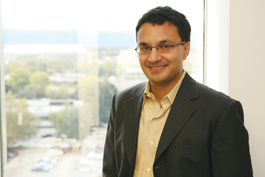home | metro silicon valley index | news | silicon valley | news article

COPS AND CONTROVERSY: Sanjeev Bery founded the San Jose chapter of the American Civil Liberties Union \ and led it into the city's contentious debate over the use of force, specifically tasers, by the SJPD.
Exit Strategy
Why Sanjeev Bery is leaving the local ACLU branch he founded in the middle of its biggest fight
By Vrinda Normand
OUTGOING ACLU director Sanjeev Bery was just wrapping up his last week at the San Jose office when he spoke to Metro about his difficult decision. The 31-year-old activist launched the group's first South Bay branch just three years ago, bringing with him a whirlwind of momentum in local civil rights issues. Now he's leaving for a different calling—Bery plans to spend at least the next year in India, exploring his cultural roots, before he gets tied down with children and a mortgage.
"It seemed like something that needed to happen now," he said with a smile. Still, it wasn't easy for him. Bery leaves the ACLU in the middle of a battle with the San Jose Police Department over the release of key "use of force" reports on tasers. Although Chief Rob Davis has generally resisted the ACLU's attempts to boost Police Department transparency, he told Metro he appreciates Bery's efforts and wishes him well.
Meanwhile, Independent Police Auditor Barbara Attard will miss her key ally in monitoring police practices. "His leaving will be a big loss to the community," she said. "He really jumped in and took to heart what the most important civil liberty issues are in San Jose."
Reflecting on the past few years, Bery opened up about the good and bad times, and his ongoing passion for the Valley's evolution.
METRO: How do you feel about leaving at this point in your work with the SCLU?
SANJEEV BERY: It was a really difficult decision. I feel really privileged to have been part of the ACLU for the past five years and to have launched the San Jose office. And I feel really torn, to be completely honest. On one hand, there's clearly a lot more work to be done, and the ACLU is committed to being a part of that work. My colleague Mark Schlosberg [from the group's San Francisco office] will be fully in the mix when it comes to police practices in San Jose. There's a 100 percent commitment to hire a new San Jose director soon. The ACLU's only begun to roll up its sleeves and work with the community. On the other hand, I have for many years wanted to spend an extended period of time in India, exploring my cultural roots, learning my background and studying some of the challenges that India faces.
What have been your biggest challeges advocating for civil rights in the Silicon Valley?
I think the biggest challenge in the short term is police transparency. The Police Department basically has a policy of secrecy when it comes to reports and other documents. As a result of that, it's next to impossible for the community to figure out exactly how police officers are acting in specific situations. For example, with the taser issue, even though the department now has new taser training guidelines in place, it's very difficult for the ACLU or other community groups to find out exactly how those tasers are being used. Even though the Police Department has given us summaries of those documents, they still haven't given us the actual police reports. And it's a big cause for concern because essentially, if a community wants to know how a government agency is operating, the government agency shouldn't be able to alter or summarize the very documents it's being requested to turn over.
You've been honest publicly about your frustration with this issue.
It's both a huge source of frustration and hope for me. At the same time that the SJPD has been completely resistant to releasing use-of-force reports and other reports, there is an ongoing mechanism, the Sunshine Reform Task Force, to help fix these problems. Soon the spotlight will shine on the City Council to see where they take the Sunshine Reform Task Force's recommendations in support of open records.
What's it been like working with local leaders?
There are so many smart, passionate people in the Silicon Valley, it's hard not to be energized just being in a room with community members who are so concerned. Every time the ACLU has had the opportunity to stand shoulder-to-shoulder with community leaders we've always as a group ended up that much more successful. That was true in Los Altos, where the City Council unanimously voted to reverse its prior position and took a strong stance in support of LGBT equality. It's why I do this kind of work. It's very energizing and uplifting to feel so many people coming together and have some tangible impact, where as individuals, people may not have thought it was possible.
What are your hopes for Silicon Valley? I hope that the prosperity and the rich resources of the valley are shared by all residents of the valley, regardless of one's background, socioeconomic status or ethnicity. Making sure that the Silicon Valley is rich in terms of standing up for civil rights is a great way to help make that a reality.
Send a letter to the editor about this story.
|
|
|
|
|
|